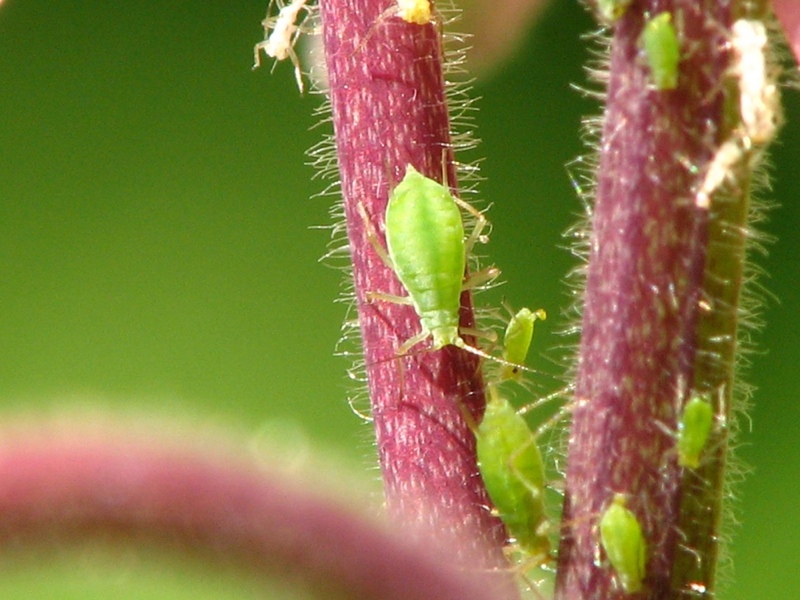Not in the Mood: Storms Quell Insects' Appetite for Sex

Sex may feel electrifying, but insects may avoid the naughty act when they detect storms are coming, a new study suggests.
As the climate changes, insect sex and other activity may shift as well, the research also suggests.
Insects are the most abundant and most diverse group of animals on Earth; scientists know of more than a million different insect species. However, their size and frailty make them vulnerable to storms' strong winds and heavy rains, which could easily kill the creatures. [Gallery: Dazzling Photos of Dew-Covered Insects]
"For an aphid, a raindrop is something like what a refrigerator would be like falling on us," said researcher Jeremy McNeil, an entomologist and chemical ecologist at the University of Western Ontario in Canada.
Sexy scents
Preliminary research from McNeil and others found that insects apparently changed how they emitted and responded to pheromones — scents linked with sex — depending on the weather. To learn more about how insects survive the perils regularly presented by storms, McNeil and his colleaguesinvestigated the mating behavior of three very different insects: the cucurbit beetle, the true armyworm moth and the potato aphid. They focused on how sex among the insects varied depending on weather conditions such as falling, stable and increasing air pressure.
Falling air pressure is linked with high rains and winds. When atmospheric pressure naturally fell due to weather conditions, male cucurbit beetles were attracted significantly less toward sources of female pheromones, the researchers found. In addition, when air pressure dropped, nearly two-thirds of male cucurbit beetles in the lab rushed through sex with females, instead of engaging in foreplay activities, such as touching females with their antennae, and the females did not take part in any rejection behaviors, as they normally do.
Get the world’s most fascinating discoveries delivered straight to your inbox.
"Insects are forecasting weather for their own lives just like we do," McNeil said. "We have weather forecasts that we use to not plan a picnic on a day where rain is announced, and since insects can't listen to the news, they have evolved their own ways of evaluating weather and modifying behavior in ways that are beneficial to their survival."
Stormy sex
In the study, when scientists lowered the air pressure in chambers containing insects, female armyworm moths released sex pheromones less often. However, female potato aphids showed less courtship behavior both when the researchers decreased the air pressure and when they increased it.
"The question is, why is there this difference?" McNeil asked.
The difference lies in aphid biology, and the fact that both rising and falling atmospheric pressure are linked with winds. Female aphids emit pheromones by crawling to the edge of a leaf and lifting their back two legs to the air.
"It's wingless, and it's clinging to life at the edge of a leaf with four of its six legs — so if there's wind, there's a chance that it might get blown away to its death," McNeil said. Female armyworm moths, by contrast, are much larger and can resist winds better — and also have wings to fly, so they may not fall to their deaths if they are blown off surfaces. [7 Amazing Bug Ninja Skills]
Future research could investigate how insects detect changes in the weather. The researchers speculated that insects might have mechanical sensors on their exoskeletons to detect faint air movements, or that changes in the size of bubbles in the guts of some beetles could help them detect fluctuations in atmospheric pressure.
McNeil also noted that the researchers concentrated on insect communication via scents. "It'd be interesting to see how other insects with different communications respond to weather — for instance, crickets, that communicate with sound," he said.
The researchers also would like to explore the effects of life span on insects' responses to weather. "The insects we looked at are fairly short-lived as adults," McNeil said. "Would insects with relatively long lives respond in the same way to weather? Crickets may live for three months — maybe young adults might shut down their behavior when cues indicate bad weather is coming, but might older individuals with a shorter life expectancy go take a risk?"
As the globe proceeds to warm, these findings suggest climate change" might change the behavior of insects as well — not only of pests, but also of beneficial insects," McNeil said.
The scientists detailed their findings online Oct. 2 in the journal PLOS ONE.
Follow LiveScience @livescience, Facebook & Google+. Original article on LiveScience.



